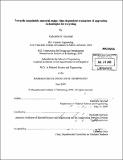Towards sustainable material usage : time-dependent evaluation of upgrading technologies for recycling
Author(s)
Gaustad, Gabrielle G
DownloadFull printable version (34.45Mb)
Alternative title
Time-dependent evaluation of upgrading technologies for recycling
Other Contributors
Massachusetts Institute of Technology. Dept. of Materials Science and Engineering.
Advisor
Randolph E. Kirchain.
Terms of use
Metadata
Show full item recordAbstract
As consumption in the US grows, so does concern about sustainable materials usage. Increasing recycling is a key component within a broad arsenal of strategies for moving towards sustainable materials usage. There are many barriers to increasing recycling; one that is problematic is compositional uncertainty in the scrap stream. Repeated recycling compounds this problem through the accumulation of tramp elements in the material stream over time. Pertaining to the available operational and technological strategies that exist to mitigate accumulation, this thesis addresses the following questions: 1) How effective are these strategies at mitigating accumulation? 2) Under what conditions do upgrading technologies provide a cost efficient and environmentally effective improvement to the composition of recycled scrap streams? To answer these, a method was developed combining dynamic material flow analysis with optimal allocation of those materials into production portfolios using blending models. This methodology thus captured 1) the flow of EOL scraps, 2) how the economics of production are affected by changes in technology, and 3) a characterization of how recycling parameters influence accumulation in recycled streams. Using this methodology, optimal allocation was found to be an effective strategy for mitigating accumulation, for example, iron in the scrap stream was 69% less when compared to the value projected by conventional statistical methods. Two upgrading technology cases were examined using the time-dependent methodology developed: shredding, sorting, and dismantling of aerospace scraps and fractional crystallization. (cont.) Case results indicate that the time-dependent value of these technologies relies on whether or not the scrap stream is compositionally or availability constrained. These values were compared to analysis that does not consider repeated recycling (time-independent). Results show that undervaluing will occur in a regime where scrap availability is constrained and there is significant compositional accumulation occurring, a regime that may very well represent the reality faced by aluminum secondary producers in the US.
Description
Thesis (Ph. D.)--Massachusetts Institute of Technology, Dept. of Materials Science and Engineering, 2009. Cataloged from PDF version of thesis. Includes bibliographical references (p. 151-160).
Date issued
2009Department
Massachusetts Institute of Technology. Department of Materials Science and EngineeringPublisher
Massachusetts Institute of Technology
Keywords
Materials Science and Engineering.